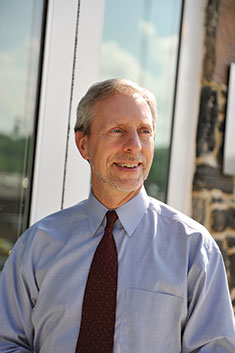Giving Back
UMBC Geography Graduate '84
GIVING BACK – GREG CANTORI ’84, GEOGRAPHY
 There’s a conventional wisdom that nonprofits should be run like businesses. Be accountable. Watch the bottom line. But Greg Cantori ’84, geography, argues that this thinking’s just as useful the other way around.
There’s a conventional wisdom that nonprofits should be run like businesses. Be accountable. Watch the bottom line. But Greg Cantori ’84, geography, argues that this thinking’s just as useful the other way around.
“Businesses need to be run more like nonprofits,” says Cantori, 52, who was appointed in October as president and CEO of Maryland Nonprofits – an advocacy group for the state’s more than 1,400 nonprofit organizations.
Corporations can learn from nonprofits, for instance, that social responsibility shouldn’t be an add-on. “It needs to be embedded into the corporate structure,” Cantori explains. “The best companies to work for watch the bottom line and take care of others.”
Cantori illustrates his point by reaching for a bag of Michele’s Granola. He points out that Michele Thornett has made a success of her Timonium-based business by employing forward-looking strategies that are as good for the environment as they are for the spread sheet.
“Everything we do has an impact on others,” he observes.
Cantori has just about finished moving into his Hampden office. Photos of his sailboat rest against the wall, waiting to be hung. Parked by the door is the bike he uses to commute each day to the Pasadena home he shares with his wife, Renee, and their two daughters.
As head of Maryland Nonprofits, Cantori leads an organization that does more than advocate for this key sector in the state’s economy. The group also seeks to educate and engage those who run nonprofits and strengthen their organizations, offering advice on everything from fundraising to social media, and helping to develop policies and create uniform standards for excellence. It even does group buying for things like health insurance and copier services.
Cantori’s UMBC roots have stayed strong. His late father, Louis J. Cantori, was a longtime political science professor and rowing coach at UMBC. His brother, Eric Cantori ’86, computer science, is also an alumnus. And he also has two nieces in the classes of 2013 and 2014.
As a student, Cantori worked with Thomas D. Rabenhorst, director of instructional cartography in UMBC’s geography department, to produce a bicycle map incorporating slope for Baltimore City and County. “I absolutely loved cartography,” he recalls. Cantori even field tested the routes himself.
It is a “landmark work,” says Rabenhorst. “We’ve used it as a model for a number of other bike maps we’ve produced over the years.”
Now, Cantori is thinking about combining cartography and fundraising to improve Chesapeake Bay water quality. He recently met with Rabenhorst, as well as Joseph School and Sandy Parker of UMBC’s geography department to develop a graduate project in waterfront GIS (geographic information systems) database and mapping. The project will likely start as a small scale study before taking on the mapping thousands of miles of shoreline, but Rabenhorst says he’s delighted to work with a former student who has “a heart for humanity — and people in general.”
That sympathy for others and the desire to put it into action is partly why Cantori moved from a successful post-graduation career in the defense mapping industry onto his present path.
“Nonprofits have always been part of my life,” says Cantori, who also holds an MBA from Loyola University. He’s worked on both sides of the equation as a director of operations with the Marion I. & Henry J. Knott Foundation (a key source of philanthropic giving to Maryland nonprofits) and helping run nonprofits including the Downtown Sailing Center and Light Street Housing – a nonprofit that endeavors to move people from homelessness to homeownership.
Cantori’s heart – and his savvy as a businessman and leader – are going to be necessary as he helps guide Maryland nonprofits through the continuing challenges of a recession that tamps down philanthropic giving and the effects of a federal government sequestration process that is only beginning to be understood.
Donations to nonprofits may drop in a worsening economy, he observes, but the human capital of volunteerism may increase in that climate.
“Philanthropy is something we can do all the time,” Cantori says. “You can see it making a difference.”
– Mary K. Tilghman ’79
Posted: August 8, 2013, 4:10 PM